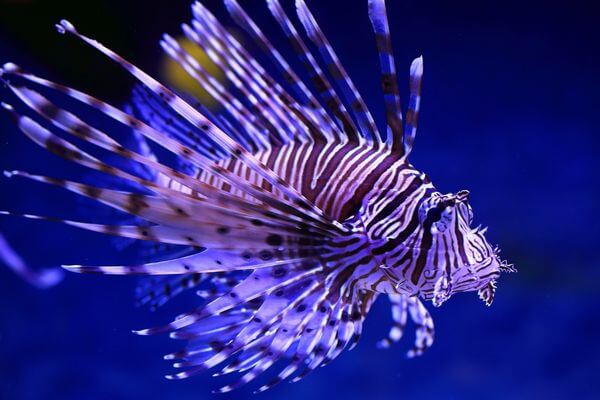Lionfish is an invasive species that has been threatening marine ecosystems around the world. Native to the tropical waters of the Pacific and Indian Ocean, it was accidentally introduced into the western Atlantic in the 1980s and has since spread rapidly, threatening the biodiversity and health of coral reefs and other marine habitats.
In this article, we will explore the origin of the lionfish, the reasons behind its proliferation into new habitats, the impacts on native fish populations, the marine food chain, coral reefs and other species, as well as the implications for commercial and recreational fishing. We will also discuss current efforts to control its population and limit its spread, and the role of public awareness in preventing its spread.

The Reasons Behind Lionfish Proliferation
The lack of natural predators and the high reproduction rate of the Lionfish are factors that contribute to its proliferation in new habitats. This species is native to the tropical regions of the Indo-Pacific, since it was accidentally introduced into the Atlantic Ocean and has spread rapidly to new areas, including the Caribbean Sea and the east coast of the United States.
One of the reasons for its rapid spread is its ability to adapt to different environments and living conditions. This species is able to survive in shallow and deep waters, in varied temperatures and in different types of substrates. In addition, because it is a highly efficient predator, with a varied diet that includes fish, crustaceans and molluscs, which allows it to feed on a wide variety of marine species. These adaptations, combined with its rapid rate of reproduction, contribute to its spread into new habitats and the proliferation of its population.
Lionfish Impacts on Native Fish Populations
As the lionfish is a voracious predator that feeds on a wide variety of fish and marine invertebrates, this can lead to a decrease in species diversity in invaded habitats and an ecological imbalance in the marine food chain. Furthermore, it can become a threat to native fish species and their survival.
Its voracious feeding on fish and other marine organisms has directly affected the diversity and quantity of native species in the regions where it is established, altering local ecosystems and creating imbalances in the food chain.
Furthermore, the invasion of this predatory species can have indirect effects on marine biodiversity and ecosystem services. For example, the elimination of herbivorous fish such as parrotfish species, which are important for controlling algal growth on coral reefs, can lead to an overgrowth of these algae, negatively affecting the health of the corals and, by consequently, fishing and tourism in these areas. Therefore, it has a cascading impact on the entire marine ecosystem, causing significant changes that can affect human life and the economy in coastal regions.
The Implications of Proliferation for Commercial and Recreational Fisheries
Lionfish proliferation also has significant implications for commercial and recreational fisheries, due to their voracity for feeding on a wide variety of fish species, including some that are economically important for fisheries, such as parrotfish and tuna. As these populations decline, commercial fishing can be significantly impacted, which can lead to job losses and a decrease in food production.
Furthermore, the proliferation can have a negative impact on recreational fishing, as these fish are highly sought after by sport fishermen. As it is an invasive species it is not protected by fisheries regulations, meaning there are no limits to the amount of the invasive species that can be caught. This can lead to overexploitation of these species, which can lead to a decrease in marine species diversity and abundance.
The Role of Public Awareness in Preventing Lionfish Breeding
Public awareness is an important part of preventing sprawl as it will help educate people about the dangers of introducing invasive species into new habitats and the importance of taking preventive measures to stop their spread. In addition, public awareness can encourage people to take precautionary measures when traveling to areas where an invasive species is present, such as not letting live aquarium fish escape into natural bodies of water.
Another form of awareness is through campaigns to clean beaches and rocky shores, where volunteers and divers can remove captured lionfish. These campaigns not only help protect marine biodiversity, but can also be an opportunity to educate people about the importance of marine conservation and preventing the spread of invasive species.
The Threat to Marine Biodiversity and the Conservation of Endangered Species
Lionfish can compete with other native species for resources and predation, which can lead to dwindling native populations. As a result, many native fish species may be threatened or even driven to extinction, especially those that are endemic or have a restricted geographic distribution.
The destruction of natural habitats and the decrease in biodiversity can lead to an imbalance affecting the entire food web and compromising the survival of threatened and vulnerable species such as crustaceans, molluscs and invertebrates that make up the food chain of coral reefs.
The Importance of Collective Action and International Cooperation for Preventing the Spread
Lionfish proliferation can have a devastating effect on marine biodiversity and the conservation of endangered species. Some experts warn that if effective measures are not taken to control its population, this species could become one of the greatest threats to marine ecosystems worldwide. Prevention requires collective action and international cooperation. It is necessary for countries to work together to develop effective control strategies and limit the spread of this species.
It is important that governments, non-governmental organizations and the general population are aware of the danger this species represents and the actions that can be taken to prevent its spread, being crucial to prevent it from spreading to new areas.
In summary, lionfish are a growing threat to marine ecosystems worldwide. Public awareness and international collaboration are key to controlling its population and preventing it from spreading geographically. Collective action is needed to protect our oceans and ensure the sustainability of marine resources for future generations.

